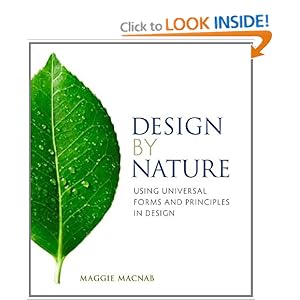 This is from “About The Author” from a wonderful book, “Design By Nature – Using Universal Forms And Principles In Design,” published 2012.
This is from “About The Author” from a wonderful book, “Design By Nature – Using Universal Forms And Principles In Design,” published 2012.
Quote from the first chapter on intuition and creativity, “The intuitive mind is a sacred gift, and the rational mind is a faithful servant. We have created a society that honors the servant and has forgotten the gift.” – Albert Einstein
Maggie Macnab grew up in Santa Fe, New Mexico with her parents, Sandy, an architect, and Arden, a poet and teacher, and her younger brother Jesse. Her interest in nature and its creative potential was encouraged by her father who gave her a microscope at age nine to see the invisible, read her science fiction shorts as bedtime stories, taught her to observe and draw nature, and took her camping and horseback riding in the high deserts of New Mexico. She learned early on to appreciate nature in all of its many guises in beautiful and mysterious places such as Chaco Canyon,the Sangre de Cristo Mountains, Big Bend National Park, Puye Cliffs, and the Santa Fe River on Upper Canyon Road.
Maggie left school at age 16 with one credit outstanding toward graduation, determined not to spend another year in the public education system, and began training in commercial art (the predecessor to design) in Albuquerque in 1973 as a production artist. She learned hands-on with hot metal and emerging computerized typesetters, printers, and ad agencies in Albuquerque and Austin. Maggie started her freelance business in Albuquerque in 1981, subsequently winning national awards and receiving recognition in national design magazines and books from 1983 on. She raised her two children, Evan and Sommer, in the Sandia Mountains.
Maggie teaches design theory at the Digital Arts Program at the University of New Mexico/Albuquerque and for Santa Fe University of Art and Design. She is the most part self-taught and has pursued education in her own way, never looking back.
The takeaway: pay attention to and honor what you feel your gifts are and don’t be afraid to go where they take you.
